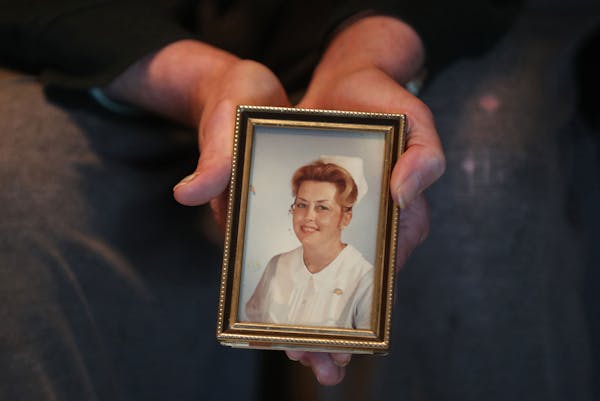Under pressure from legislators and families of elder abuse victims, state health officials have made dramatic gains in reducing a huge backlog of unresolved complaints of maltreatment in Minnesota senior care facilities.
The Minnesota Department of Health has cut the tally of unresolved maltreatment allegations by nearly 80 percent, from 3,147 to 712, in the past six weeks.
The remaining backlog includes reports of maltreatment in senior care homes that have never been reviewed by state officials, as well as investigations that are still ongoing, the agency disclosed in a report Monday.
The rapid gains reflect a broader effort by the Health Department to improve its handling of the more than 20,000 allegations of maltreatment it receives each year. The allegations range from neglect to financial exploitation to violent incidents of physical and sexual abuse.
The agency's system for responding to and investigating allegations has come under fire in recent months for being slow and unreliable, with some families kept in the dark for months about state investigations and criminal abuse cases that are never resolved, according to a recent Star Tribune investigation.
"The fact that this backlog occurred and built up is extremely regrettable," said Health Commissioner Jan Malcolm, who was appointed to lead the agency last month after the previous commissioner resigned. "We do believe that all the attention that's been brought to this, and the concern that's rightfully elevated this as a priority, is serving to get us all focused on building more robust processes."
Eliminating the giant complaint backlog is one of several major initiatives advanced by Gov. Mark Dayton's administration to improve the speed and quality of elder abuse investigations. The Health Department is also communicating more regularly with victims of abuse and those who report maltreatment by giving them more frequent updates on the status of their complaints. In the past, abuse victims and their families would sometimes be forced to wait months for basic information as state abuse investigations dragged on indefinitely.
The state health agency is also shifting away from its longtime reliance on an antiquated, paper-based records system for handling elder abuse complaints.
In interviews last year, employees at the agency's Office of Health Facility Complaints (OHFC) said paper complaint records were stacked up to 2 feet high in staff cubicles, and would sometimes go missing or would be permanently lost, further frustrating family members of abuse victims. The state has begun testing a new automated case records system that will speed up the process for investigating complaints, while enabling the agency to better categorize complaints and better respond to emerging patterns of abuse. That new system should be in place by July, officials said.
As the population of seniors seeking care has increased, the Health Department has been overwhelmed by a dramatic surge in maltreatment complaints.
The agency received 25,226 reports of maltreatment in senior care facilities in 2016, a sevenfold increase since 2010; and the agency continues to receive 400 new complaints each week. The agency has failed to keep pace with this increase, and in 2016 investigated only 3 percent of maltreatment complaints on site. Even when the state does investigate, the cases can drag on for months, frustrating families and undermining criminal prosecutions, the Star Tribune found.
Responding to this crisis, Dayton in December gave the much-larger Department of Human Services (DHS) sweeping new powers over the OHFC. As part of an unusual partnership agreement, DHS agreed to share its staff and technical expertise at reducing maltreatment complaints.
Backlogged complaints are familiar territory for DHS, which in 2014 fell deeply behind in its investigations of state-licensed facilities. Through a series of process improvements, DHS managed to eliminate its backlog and now completes about 90 percent of its investigations within the 60-day time frame mandated under state law, officials said.
Working collaboratively, state officials found that many of the maltreatment reports got bogged down in the OHFC's intake area, where cases are triaged and assigned to investigators based on their severity. In interviews, OHFC staff said cases would sometimes sit on desks for weeks or months because of uncertainty over whether a case was serious enough to warrant an investigation. Now, intake staff are responding to each complaint with a standard list of questions to determine the level of actual or potential harm and how to respond, officials said.
"We are moving through these [complaints] a lot more efficiently — because we now have a very standardized and consistent process," said Gilbert Acevedo, assistant state health commissioner.
Even so, elder care advocates and several prominent lawmakers say efforts to streamline OHFC's abuse response system, while important, do not go far enough at addressing deeper problems with the state's regulatory system for protecting seniors. Last month, a work group of senior advocacy organizations and families of abuse victims released a 58-page report calling for tougher criminal sanctions against abusers; greater access to state investigations for victims and their families; and stronger oversight of the lightly regulated assisted-living industry.
Sen. Karin Housley, R-St. Mary's Point, chairwoman of the Senate Aging and Long-Term Care Policy Committee, said she plans to introduce a broad elder abuse bill this session that would address multiple gaps in the state's current system. The legislation would make abuse reports and investigations more readily available to victims and their families, and strengthen the rights of older residents in senior care facilities, she said. Her bill would also clarify in law the rights of families to place cameras inside rooms to monitor the quality of care of their loved ones.
"It's amazing when you go public and hold government to be accountable what they actually can get done," Housley said of the state's progress at reducing its complaint backlog. "It's unfortunate that it took so much to get this done."
Chris Serres • 612-673-4308 Twitter: @chrisserres
Democrats clear path to bring proposed repeal of Arizona's near-total abortion ban to a vote
Biden is off on details of his uncle's WWII death as he calls Trump unfit to lead the military
North Carolina university committee swiftly passes policy change that could cut diversity staff
Trump lawyers say Stormy Daniels refused subpoena outside a Brooklyn bar, papers left 'at her feet'

